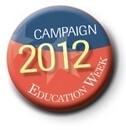So far in this campaign season, education has gotten about as much airtime as saving the ivory billed woodpecker. But some folks at the College Board (aka the people who bring you the SAT and AP testing) are hoping to change that.

The organization today released a survey of swing state voters, showing that the folks candidates are hoping to reach want to hear way more about how they plan to address issues like school funding and college affordability.
It turns out that education is a top-tier issue, even though you’d never know that from the amount of discussion it gets. Sixty-seven percent of the voters surveyed say education is “extremely important to them personally” in this year’s election’s for president and Congress. That puts it on equal footing with issues voters hear way more about, like government spending (69 percent), health care (67 percent), and the federal budget deficit (64 percent).
And this issue is up for grabs, said Geoff Garin, president of Hart Research associates, which helped to conduct the survey. Right now, Democrats have a slight edge, with 44 percent of the voters surveyed saying that the party reflects their priorities. Thirty-one percent feel the same way about Republicans.
That gap wouldn’t be impossible for the GOP to overcome, Garin said.
“This is really open turf,” he said. “Either party can distinguish itself with the voters on education.”
Other findings:
•A majority of the voters surveyed—55 percent—would actually be willing to pony up an additional $200 a year in taxes to improve education systems. And 78 percent of the voters surveyed say that increased funding for education is necessary, while just 21 percent say it’s not necessary.
•So where should the funding go? Voters’ top priority is making sure schools can provide arts, music, and physical education classes to all students. In fact, 59 percent say that’s extremely important. College affordability is another biggie. Voters want to see any extra money go to holding down tuition at state colleges, universities, and community colleges, with 56 percent of respondents saying that’s extremely important.
•Voters don’t necessarily place a priority on the issues that the Obama administration has steered money to. Just 31 percent want to see funding go to expand school options, such as charters. And just 24 percent place a priority on merit-pay bonuses for teachers. School choice doesn’t seem to register much either—just 17 percent of voters want to see money for vouchers to help low-income parents pay for private schools.
•Three out of four voters say having a post-secondary degree or credential is important to achieving success in the workplace. (But maybe these voters are snobs?)
•Talking about education can make a candidate look good. Eighty-six percent of the voters surveyed said that putting a priority on education makes candidates appear forward-looking. Of course, 50 percent think that could mean the person is a “tax and spend liberal.”
•Voters are ambivalent when it comes to just how much of a role the feds should have in improving education. 76 percent of those surveyed said it’s important for the president and Congress to address it. But 57 percent said the feds are already too involved in education, and should leave it up to states and locals.
Some methodology: The survey, which was done by Hart Research Associates and North Star Opinion Research, took the pulse of 1,839 registered voters in nine swing states from March 15 to March 20. The states included: Colorado, Florida, North Carolina, Ohio, Pennsylvania, Nevada, New Mexico, Virginia, and Wisconsin.
So where is all this going? College Board has decided to launch its very own grassroots effort to make education a top-tier (or at least, more important) issue in the campaign. So far, they’ve gone as far as creating a website “Don’t Forget Ed!”
The track record on such “grassroots” efforts is mixed. Longtime Politics K-12 readers probably remember ED in ‘08, the “grassroots” organization that tried to make education a major issue in the last presidential election, and managed to instead get dissed by edu-uber-funder Bill Gates. He helped foot the bill for the effort (with the Broad Foundation), but ultimately decided it amounted to not much more than “mouthing platitudes.” Maybe the effort was doomed from the start. It’s hard to get voters clamoring in the streets for say, extended learning time, which was high on ED in ‘08’s wishlist.
College Board said their effort will be different, in part because they don’t think people will accuse them of being too Madison Avenue rather than grassroots (a critique of ED in ‘08).
“We can’t afford Madison Avenue,” joked Peter Kauffmann, a spokesman for the College Board. Instead, the organization will be working with its members—including lots of school counselors and teachers—to put pressure on candidates (including gubernatorial and senate contenders) to flesh out their positions on education and give it more attention.
